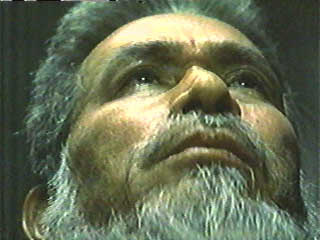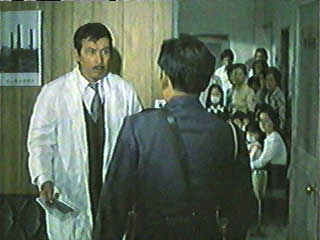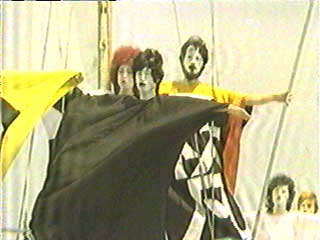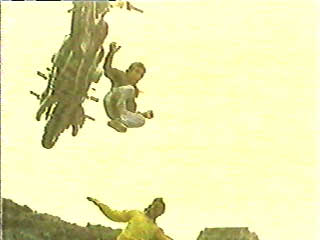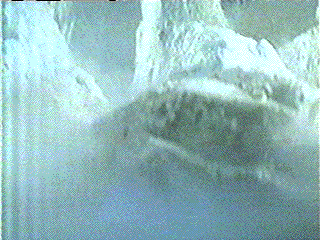The Last Days of Planet Earth

Even Nostradamus didn't seem to be impressed with his own powers, as he quit the prophecy biz after a few years to become a perfume manufacturer. However, his alleged abilities continue to captivate generations long after his death, and are the inspiration behind the Japanese film The Last Days of Planet Earth.. Maybe if he had seen this coming, he might have kept his big yap shut. Of course no prophet worth his salt goes without predicting disasters and ultimately, the end of the world. It is with this subject that Last Days concerns itself. But first there's a long narrated prologue that tells us how great Nostradamus was. Nostradamus even appears on screen briefly, revealing him to be a Japanese guy, who used books that opened from left to right (as they traditionally do in Japan) and occasionally wrote in English. We are then introduced to our main character, Dr. Nishiyama (Tetsuro Tamba). His first line is "Sometimes I wonder if they have human brains." Hoo-boy, this one is going to hurt.
The Last Days of Planet Earth takes place in the future (it was also known as Catastrophe: 1999*), but it still looks like 1974. Things have gotten so bad by whenever it is the movie takes place that the signs of the apocalypse, as put forth by Nostradamus, are now clear. The first sign is the appearance of giant slugs in Japan. Dr. Nishiyama, his daughter Mariko, and her photographer boyfriend all rush off to see the giant gastropods. But lo and behold, the Japanese army has decided to destroy the slugs with flamethrowers. Nishiyama realizes that the Japanese government is going to cover up all the bad stuff that's happening. What other kind of bad stuff is happening? Well, we have snow on the Great Pyramids, melting polar caps, Japanese school kids developing superpowers right out of an episode of Wonder Woman, and a Super Sonic Transport exploding over New Zealand. This last disaster leads to some wonderfully upbeat scenes where a UN discovery team in the New Zealand jungle is attacked by giant bats and radiation scarred cannibals.
But wait, there's more. There's a scene that portrays young people riding their mototrcycles off a cliff. Apparently the studio could only get two stuntmen to actually do it, because it's the same two guys driving off the cliff over and over again, wearing different clothes each time. Then there's the "regatta of death," where young people dress up in bizzare, colorful kimonos and paint their faces black and white and sail small boats out into the open sea in order to commit suicide. We guess this was supposed to be poignant or something, but the participants all look like rejected sidekicks for Bozo the Clown. These suicide rituals are supposedly the hippies' attempts to help thin out the population for the good of all humanity, but you know those Japanese hippies. They just can't do anything without making a show or singing a song.
The movie finally dissolves into an orgy of stock footage, as World War III breaks out, volcanoes explode, and cities are wiped away by floods. Finally the big ones fly (footage culled from earlier Japanese films) and we are treated to the sight of nuclear armageddon. In the aftermath, two horribly mutated survivors fight over a worm... ..."And that's what might happen!" Huh? Suddenly we're back to Dr. Nishiyama, once again talking to people who don't want to be listening to him. At some point the movie became a "this could happen" story, though exactly where the transition was made isn't clear. That may be because the US version of the film was cut by as much as eighteen minutes. Whatever the case, this development really undercuts the film's drama. Finally, we're told that Nostradamus actually predicted that we can change the future by our actions. Wait a minute, isn't that totally contrary to the whole concept of a prophecy? If we can change the future, who cares what's been foretold? Needless to say, the real Nostradamus never displayed the enviromental tendencies this film posits he had.
All the way through, this is an unpleasant and nearly unwatchable film. Dr. Nishiyama is unlikable because he's so damn preachy, and the rest of the characters aren't much better. While the film's anti-pollution message is somewhat laudable, the science we are shown is all fictional, and assumes that new technology to deal with pollution is impossible to invent. The worst insult is that the film keeps invoking the name of Nostradamus and telling us how great he was without once relating events about which he actually wrote. Our prediction? You will not enjoy The Last Days of Planet Earth. But then, we guess you're not supposed to.
 Review date: 8/11/99 
This review is © copyright 1999 Chris Holland & Scott Hamilton. Blah blah blah. Please don't claim that it's yours blah blah, but feel free to e-mail it to friends, or better yet, send them the URL. To reproduce this review in another form, please contact us at guys@stomptokyo.com. Blah blah blah blah.
|
